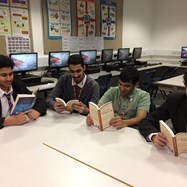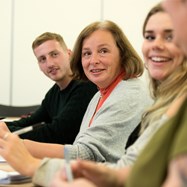John Denham's speech on Widening Participation
08 April 2008
In response to the Secretary of State John Denham’s speech on widening participation to the Higher Education Funding Council for England (HEFCE) annual conference, Director General of the Russell Group, Dr Wendy Piatt, said:
"Russell Group Universities are happy to include more information about our admissions policies and how we equip our staff with the skills and knowledge to identify talent in the OFFA access agreement. Our institutions have robust procedures in place to ensure that anyone involved in admissions has access to on-going advice and guidance about admissions policies and how to select the candidates who have the ability to flourish on our courses. Our universities publicise their admissions policies on their websites, UCAS entry profiles, in prospectuses and, in some cases, through podcasts and videos online. All our institutions have strategies to widen access through summer schools, access courses, admissions policies which take a variety of factors into account, links with a diverse range of schools and colleges as well as the raft of initiatives which incentivise students to volunteer in schools to raise aspirations and tackle under-achievement.
"The Russell Group welcomes the Secretary of State's recognition of the importance of ensuring that all pupils have the opportunity to go on to the best suited university and course for them. Choices made at this time are crucial to maximising a young person's life chances. We know, for example, that taking maths A-level equips students well to take a range of courses and has a wage premium of up to 11% over their peers. Similarly going to a Russell Group university confers an additional wage premium of up to 6% - 10%.
"We have been very concerned by recent evidence which shows that children from state schools are less likely to take STEM and other traditional courses. One reason for this is that some schools are not offering subjects such as separate sciences at GCSE. We know, for example that students who take separate science GCSEs are over 75% more likely to do well in science A-levels, such as Chemistry.
"It is crucial that all pupils are given accurate information, advice and guidance when making choices about subject options which will affect their life chances. It is particularly important that pupils from families with less experience of higher education are given robust support and guidance along with the opportunity to study key subjects like physics and chemistry. We are concerned that pupils from some schools are increasingly taking a combination of subjects which puts them at a disadvantage in competing for certain university courses and which limits their future options.
"We are also concerned by evidence that teachers may not be encouraging some of their students to consider Russell Group universities. A recent survey commissioned by the educational charity the Sutton Trust suggested that a significant proportion of secondary school teachers in England and Wales held unhelpful prejudices about institutions such as Oxford and Cambridge. 9 out of 10 of the teachers surveyed underestimated the number of state school pupils presently at Oxford and Cambridge, whilst almost half of teachers surveyed said that they 'rarely' or 'never' encourage academically-gifted pupils that they teach to apply to these institutions. Both the Sutton Trust survey and a study by the National Foundation for Education Research found that teachers at comprehensive schools were more likely to incorrectly think that studying at Oxford or Cambridge is more expensive than other universities. Research has shown that teacher expectations are one of the strongest predicators of attainment for those from lower socio-economic groups. Advice from teachers can therefore have a particularly strong influence on students from lower socio-economic backgrounds.
"Russell Group Universities acknowledge that more needs to be done to provide school and FE college students with the highest level of information, advice and guidance. That is why Russell Group universities are providing a huge array of mentoring and volunteering schemes to raise aspirations, awareness and attainment. For example, Imperial College London's INSPIRE ("Innovative Scheme for Post-docs in Research and Education") scheme allows post-doctoral research assistants from science, engineering and medical related disciplines to be employed on two-year contracts at schools affiliated to the Specialist Schools Trust in or around London; the University of Nottingham's 'Numbers Partners Project' and 'Time to Read' places student volunteers in local schools to encourage school children to develop their maths and reading skills.
"We welcome the Secretary of State's acknowledgement that widening participation activities in schools are as valuable - if not more so – than offering bursaries. We need to tackle low aspirations as early as possible. There is a robust body of evidence which indicates that the link between socio-economic background and educational achievement is apparent as early as 24 months. Under-achievement at school, caused by complex factors, is the root and primary cause of the under-representation of students from lower socio-economic backgrounds in university.”
Notes to Editors
- Take-up of STEM and traditional subjects
- Roughly 80% of physics teachers in independent schools have a degree in physics, compared to only 30% of those in state schools.
- Fewer than one in 10 students take one+ science A level in mainstream and science specialised schools compared with roughly one in three at grammar and independent schools.
- From 1997-2006 entries fell 18% (maths), 11% (physics) and 6% (chemistry) despite total entries soaring 12%. From 1988-2004 maths entries fell 40%. Last year numbers increased somewhat in chemistry, biology and maths (following curriculum changes); but a drop in physics take-up continued by 2%.
- 35% of further maths entries and 34% of modern foreign language entries are in independent schools compared to 15% on average across subjects.
- Independent school students are roughly three times more likely to be doing further maths and 2.5 times more likely to be doing a modern foreign language A-levels.
- It is notable that pupils who take combined sciences are significantly less likely to then take A-level sciences. Pupils who take separate science GCSEs are 76% more likely to get an A or B grade in A-level chemistry compared to those who take double-science.
- The number of school students taking French, German or Spanish at GCSE has remained steady since 2002 in the independent sector at approximately 80%. In the
-
Hamir Patel
hamir.patel@russellgroup.ac.uk
020 3816 1316
-
Hollie Chandler
Hollie.Chandler@russellgroup.ac.uk
020 3816 1307
 X
X


